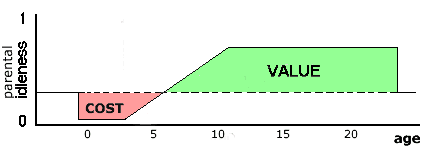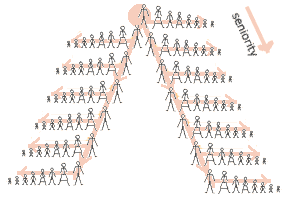
In the system of tools they use, humans are themselves also tools. In fact, they are the primary all purpose tool, able to perform all kinds of tasks unaided. Knives, hammers, spades, cups and computers, merely extend and improve abilities humans already possess.
A Profitable Enterprise
Just as carpenters make chairs and tables, and blacksmiths make knives and forks, so families make boys and girls. And in time these children are able to relieve their parents of much of their work. Long before humans started making tools, they were breeding obedient sons and daughters.
At first these children require a considerable care and attention, but within a few years they are able to walk and talk, and, more importantly, to assist with the tasks of everyday life. And as they grow stronger and more skilled, they are able to carry out greater tasks, and also maintain themselves. Therefore, while a child comes at a considerable cost, in time - like any useful tool - that child will prove to be of greater value than their cost, as he or she relieves parents of their work.

At some point, a child becomes an independent adult. This may be when their parents die, or become incapable of controlling them - or because at some point they are regarded as having provided sufficient value, or have reached some age of independence.
But equally, if children are regarded as possessions like knives or tables, they might be sold as slave labour.
It is needless to say, but humans come in two varieties - boys and girls, or men and women. In general the men are physically stronger than women, and therefore make the best workers. Accordingly, most families desired to produce strong, useful sons.
Although weaker, and therefore less able to work, women possess the ability - with the brief assistance of men - to produce further sons and daughters. Women are not as useful as men in the short term, but in the longer term, they alone have the ability to produce useful new offspring. Men are short term investments, and women are long term investments.
The basic family unit is one man and one woman, but there might be any number of variations. One man might have several wives, or one woman several husbands. Or many men may share many wives.
Just as farmers selected and bred plants and animals, human families probably selected and bred human types, for strength, endurance, intelligence, and whatever traits they were able to re-enforce through judicious matings.
In general, the largest families will tend to be produced in the poorest or least idle societies. In a 20% idle society, it will take 4 children working continuously to relieve one parent of the entire burden of their work, since each child will only be able to devote 20% of their time to perform work for parents. So it will require 8 children to support 2 parents. And in low idleness societies, parents may be unable to provide sufficient care for infants, with a resulting high infant mortality. Equally, producing so many children must often result in maternal death.
However, at lower levels of social idleness, the rewards from children diminish. In a 10% idle society, it would require 18 children to do the work of both parents. Such numbers are impossible, particularly given even higher infant mortality. And so in the very poorest societies, the cost of raising children might exceed their value to parents, and families would dissolve.
By contrast, in a 50% idle society, one grown child can relieve one parent of their work, and two children can support two parents. And in an 80% idle society, one grown child can support both parents and remain 40% idle. And so the need for large families with many helping hands dwindles with increasing idleness. And in these more idle societies, infant care is likely to better than in low idleness societies, with consequent lower infant mortality. And with fewer children, mothers are less likely to die in childbirth.
Also, assuming a wear-and-tear model of ageing, life expectancy in low idleness societies is likely to be short, and longer in high idleness society. The result is that in high idleness societies, while numbers of children fall, the numbers of parents and grandparents increases. In low idleness societies, the average age of individuals is low, with many children and few grandparents. In high idleness societies, the average age is higher, with fewer children, and more grandparents.
Family Power Structure
In the family business, the principal role of women was to bear and nurture children, while the principal role of men was to gather food for the women and children.
 The result was that power - in the sense of command - generally resided with the men who fed the women, and women in turn exercised power over the children they nurtured, and older siblings exercised power over the younger. Here power is the inverse of dependency. The youngest children are entirely dependent on their mothers and siblings, and these are in turn dependent on the breadwinner fathers. The children are the possessions of the parents, and the wives the possessions of their husbands.
The result was that power - in the sense of command - generally resided with the men who fed the women, and women in turn exercised power over the children they nurtured, and older siblings exercised power over the younger. Here power is the inverse of dependency. The youngest children are entirely dependent on their mothers and siblings, and these are in turn dependent on the breadwinner fathers. The children are the possessions of the parents, and the wives the possessions of their husbands.
If of no immediate use to the family, as useful tools, sons would be sold or rented as labourers. And daughters would be sold into marriage.
In time, as parents age and die, their sons and daughters step into their shoes. The process of birth and maturation and ageing thus guarantees promotion within the family firm.
In many respects the relation between parents and children is one of trade. In their infancy, children are supported by the work of parents, and are thereby indebted to them. In their adulthood, children work to support parents, paying off the debt. It is the indebtedness of juniors to seniors that underlies the power of seniority over juniority.
However, as social idleness rises, and the task of raising children becomes easier, and children need do less work to pay a smaller debt to their parents, so parental power dwindles. In the least idle societies, parents are likely to be tyrannical taskmasters, forcing their children to work on their behalf. In the most idle societies, parents are more likely to be indulgent, undemanding supervisors.
Hierarchies of Families
When parents die, and their children start their own families, the command structure of the eldest over the youngest may continue, with the families of the eldest sons and daughters retaining a degree of command over the families of their younger siblings. And so instead of all families being equal, they become arranged in a hierarchy that reflects the seniority of their ancestors.
 The same kind of seniority or priority may apply to new arrivals in a society. The first families to settle on some land acquire seniority over other individuals or families that subsequently arrive, because it is the permission or assistance of the old families to which incomers become indebted. The oldest, most senior families form a natural aristocracy, with the head of the society being the patriarch or matriarch of the oldest family.
The same kind of seniority or priority may apply to new arrivals in a society. The first families to settle on some land acquire seniority over other individuals or families that subsequently arrive, because it is the permission or assistance of the old families to which incomers become indebted. The oldest, most senior families form a natural aristocracy, with the head of the society being the patriarch or matriarch of the oldest family.
Thus an informal command structure emerges, firstly within families, and then between families, based on debt and seniority. While decisions disputes within a family are resolved by the paterfamilias, decisions and disputes between families are resolved by referral to the patriarchs of the aristocratic families.
These aristocracies evolve over time. Families rise in status by marriage into aristocratic families. Or they may rise by using their wealth to pay off their debt, and join the aristocracy. Equally, aristocratic families may simply die out, through lack of children, or the death of children, and be replaced by less aristocratic families.
This system of seniority allows the whole of society to be organized, with a small aristocracy taking decisions the affect the whole of society, with their decisions having the force of law.
The problem of this sort of natural social organization is that the elders of the oldest families may not be the wisest, and may not make decisions or judgements which benefit society. They are likely, sooner or later, to make mistakes, and have their judgement questioned. The elders that guide a society may in many cases be sagacious, but from time to time they will prove disastrously stupid.
The Decline of the Family
If this vision of the role of families is hard to recognize in 21st century Western society, it is because as social idleness rises, children cease to be required to run errands, fetch water, herd goats, as they were in less idle societies. In idle societies, children are more a liability than a asset. Their value is less than their cost, and they become luxuries. Men and women do not marry to start child production factories. Therefore families are smaller, or non-existent. And in families which require no command structure, because the children are not required to perform any duties, there tends to be an increasing equality between husbands and wives, between parents and children, and even between humans and household cats and dogs. And with the decay of the family command structure, families increasingly disintegrate, and juvenile delinquency - i.e. nonconformity with weak parental command - multiplies.
The contraction and disintegration of the family, and of all relations of seniority and juniority, is not the consequence of 'moral decline', but rather of the redundancy of the family as a profitable, idleness-increasing enterprise. In largely idle societies, children are not in strong demand, simply because there is little work for them to do. Time comes when people stop buying chairs and tables, knives and forks, boys and girls.
And as, with rising idleness, seniority within families loses its force, so also the seniority of one family over another dwindles. And as it declines, a previously unquestionable social order unravels, as people increasingly question the birthright of aristocracies to the stewardship of society. In a society of increasing equality, and little indebtedness, the inherited right to lead and command loses its force, and all demand a greater say in the direction of society. And when all opinions carry equal weight, then decisions begin to be taken by collective vote, and leaders are elected rather than born. Either that, or as traditional chains of authority snap, societies become racked by divisions, and social order is maintained by force rather than consent.
And at the same time, other social organizations modelled on families, such as armies or corporations, are likely to experience the same dwindling of internal power relations, with soldiers or workers demanding a greater say in the running of these organizations.
